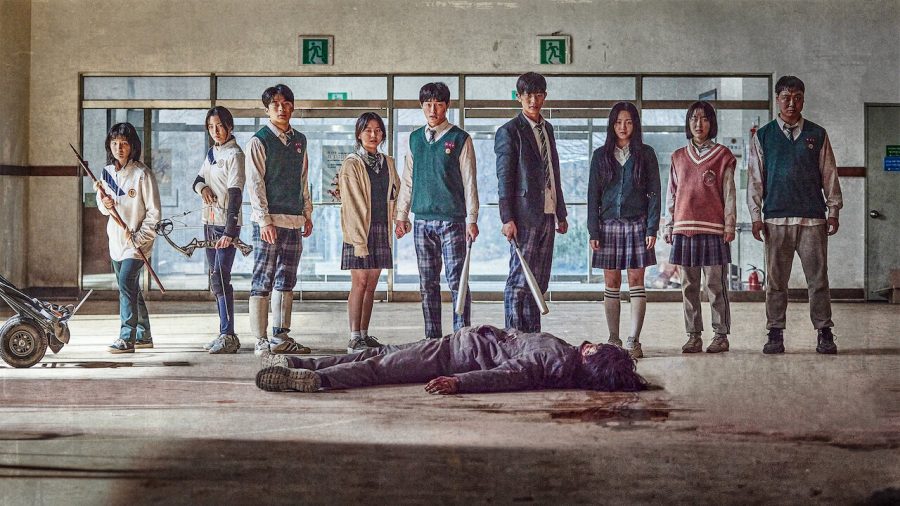“All of Us Are Dead” review
Zombies and suspense make this a thrilling ride
“All of Us are Dead” is a thrill ride that hits a little too close to home
April 6, 2022
The new South Korean Netflix horror drama “All of Us Are Dead” is about a high school in Hoysan, Korea that becomes the epicenter of a zombie outbreak. The show focuses on several different groups of students as they fight to survive against a highly infectious virus that turns people into undying flesh craving monsters. The show is rated TV-MA and has many triggering topics such as violence, gore, bullying, cannibalism, suicide and sexual harassment, so viewer discretion is advised.
Although the show seems like a typical zombie outbreak show, it goes far deeper than that. The show highlights the selfish and selfless nature of humans and how even in a life or death situation, some are only there for personal gain. Several characters throughout the show demonstrated how pride can kill.
The show follows several different groups of students as they attempt to find their way out of their zombie infested school alive; however, zombies weren’t the only things trying to kill the characters. Clashes of ideologies lead to arguments and division between the groups which is deadly in a life or death situation where everyone needs to work together.
Additionally, the show features an antagonist driven solely by revenge. Through dramatic irony, this single figure named Gwi-nam posed more of a threat than the hordes of zombies for the main group of students. Gwi-nam found power through chaos as a bully even before the infection spread, and he continues to use the mass hysteria to his advantage in attempting to bring down one of the main protectors of the students, Cheong-san.
As a fan of the show, Isabella Rodriguez had a lot to say about the introspection of human nature portrayed throughout the show.
“There were so many good elements in ‘All of Us Are Dead,’” stated Rodriguez. “I thought it was very realistic compared to the real world. For instance, not everyone is going to be a saint. Awful people are going to continue to be awful even during an epidemic. Ein-ji, a girl who was severely bullied and sexually harassed found power in being infected, but used that power to condemn the bystanders in her continuous harassment.”
In addition to the reflections of human nature, the show has many parallels to the COVID-19 pandemic and even references it in passing. Hoysan High School was ground zero for the spread of the zombie virus and a private military came to power to prevent the further spreading of the virus. Every person rescued from Hyson were forced into a quarantine camp where they would be isolated and closely monitored. This part feels eerily familiar doesn’t it?
Politics also played a large role in the plot, as a powerful politician was put into quarantine and her actions were brought into question. She defended herself and those around her stating, “Despite the punishment, I will always stand for the powerless citizens,” she even commented that she plans to use that statement to bolster her campaign in the future. A politician using a disaster to boost their career? It wouldn’t be the first time.
In a final reflection of the show, senior Kennessy Baban pointed to the show’s use of suspense.
“‘All of Us Are Dead’ keeps viewers anticipating far more with each episode ending with a cliffhanger,” she said. “Viewers like me were on the edge of our seats, anxious whether or not the character they like is alive or not. It is such an exhilarating feeling that keeps viewers wanting more.”
Overall, director Lee Jae-kyoo and Kim Nam-su did an excellent job of creating a show that gets viewers reflecting on their own world around them. “All of Us Are Dead” opens up new conversations on human nature and the strength of human will and fundamental desire to survive. “All of Us Are Dead” is a dark and thrilling must watch show for those who love horror and survivor shows.






